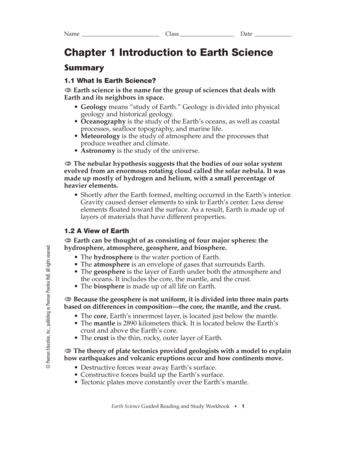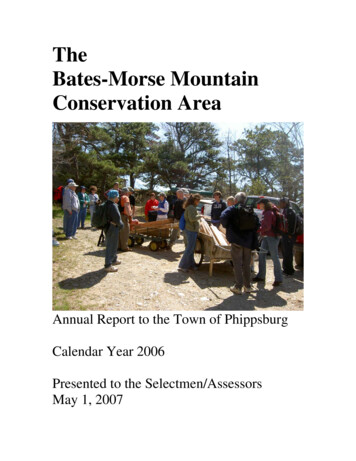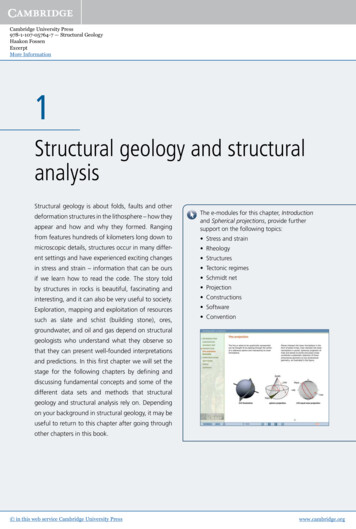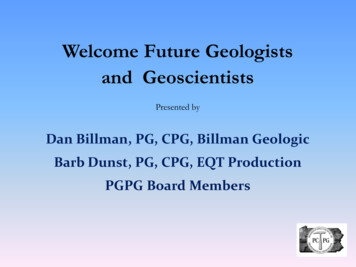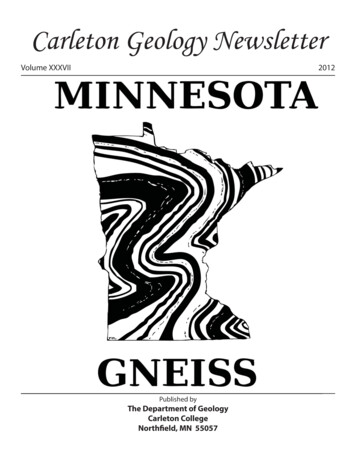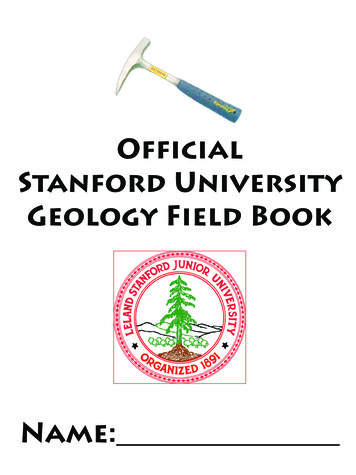
Transcription
A Handbook for Geology Students1
ContentsWhy study Geology? . 3Job Prospects and Salaries . 7Why Appalachian Geology? . 10Geology Faculty and Staff . 13Financial Support in the Department. 23Geology Department Awards and Honors . 26Opportunities and Requirements . 28Degree Programs in Geology . 35Geology Courses . 44Field Camp . 512
Why study Geology?Geology is the multi-disciplinary science that studies the earth and its history.We live on a dynamic planet that is constantly changing. Our ability to survive as acivilization and as a species is intricately linked to the geologic processes that shape ourearth, form its natural resources and allow it to recover from the abuse that our societyheaps upon it. Geology is important because virtually all the natural materials our societyneeds such as oil, gas, metals, building materials, and so forth are found by geologists.Geologic engineers evaluate roads, buildings and dams for geologic stability and hazardpotential. Environmental protection and remediation are important geologic issues facedby contemporary society.Geology is an exciting profession that typically combines indoor and outdoor work.Students of geology encounter science in its broadest sense because geologyincorporates those aspects of astronomy, biology, chemistry, engineering, mathematicsand physics that are important tounderstanding the Earth and itsinteractions with the atmosphere, thebiosphere, and the hydrosphere.The rich history of the earth gives us ouronly window into the likely impacts ofglobal climate in the future. As a science,Geology is unique in its focus on time,starting from the beginning of the Earthmore than 4 billion years ago to thepresent. Combining a knowledge offossils and environmental indicators,geologists reconstruct ancient climates,ecological systems, and geographies thatreveal vanished tropical or polar oceansand eroded mountain ranges that oncestretched across continents.Geologists play a leading role in the utilization and management of natural resources,evaluating how natural processes impact all life on Earth, and how humans interact withthe Earth. Geologists search the continents and sea floors for the minerals and fuelsessential to modern society and look for fresh water used daily by the world's peoples.They work with engineers discovering pollution of the soil and groundwater, indeveloping plans for pollution control or remediation, in siting and developing wastedisposal sites, in road and dam construction, and in evaluations of risk and planningdesigned to minimize the loss of life due to floods, volcanic eruptions, or earthquakes.Other geologists concern themselves with the history of the planet, unraveling themovements of continents, the distribution of climate-controlled rocks, and the evolutionof species and ecosystems.Geology requires problem solving, good 3D visualization and the ability to collect andprocess data accurately. Geologists are like detectives. Data that allow geologists tosolve problems seldom arrive in a linear fashion. Geologists must be able to collect3
fragments of information and develop interpretations based on those data. They must beable to separate important and trivial data and be able to adjust their interpretations asnew data are collected. Developing models, either in their mind or on their computer, isessential. Once geologists have completed their work, they must be able to effectivelycommunicate their results to others. Strong verbal and written communication skills areessential in geology. Most geologists work on practical problems that involve people.Those individuals, whether an individual landowner, an elected official, or the CEO of aFortune 500 company, want answers communicated in a way they can understand.Geologists work on every continent from the tropics to the poles and on and under thesurface of the oceans. They work on foot or from ropes in high mountains, insubmersibles and on ships, in mobile laboratories in trucks or aircraft, and in offices andlabs in universities, research parks, urban offices, and high-rise offices buildings.In these various settings, geologists use a wide range of equipment. The field geologistmay use only a hammer, compass/pocket transit, notebook, pencil, and map or GPSunit.On the other hand, geologists are the largest users of high performance computers andsatellite technologies in the world outside the government's national intelligence network.The geophysicist uses technologically complex instruments such as computer-linkedseismographs, used for recording earthquakes, andgravimeters (gravity meters) with which they canmeasure incredibly small gravitational attractions.Geochemists use sophisticated electronic instrumentssuch as ion-beam microprobes to analyze parts ofmineral grains that are microscopic in size, X-raydiffractometers to study crystal structures, and massspectrometers to date earth materials. Mineralogists andcrystal chemists, who study the nature of minerals,likewise use these instruments. Paleontologists, who study fossils, and petrologists, whostudy rocks, regularly depend on microscopes, including electron microscopes, as wellas the tools of the geochemist to analyze the objects of their interest. Engineeringgeologists use instruments such as drills, inclinometers (to measure slope movements)and bore-hole shear devices (to measure the strength of materials).As discussed earlier, geology is a broad multi-disciplinary science. As an undergraduatestudent in geology, your primary concern is to master the broad discipline of geology andits impact on society. If you pursue graduate study, you likely will specialize in one of thedisciplines of geology listed below:Crystallography: study of the chemistry and atomic arrangement of atoms in mineralsEarth System Science: study of the interaction of oceans, atmosphere, and the solidearth for the purpose of understanding past, present, and future environmentalconditionsEconomic Geology: genesis, location, and other aspects of economic materials;includes metallic, non-metallic (industrial rocks and minerals), and groundwater supplies(location and occurrence of subsurface water)4
Environmental Geology: geological study of our natural environment; primarilyconcerned with depletion of natural resources, preservation of environmental quality,pollution problems, and natural hazardsField Geology: collection, interpretation, and synthesis of geological data in the field(outside, in nature); generally consists, at least in part, of making geologic mapsForensic Geology: interpretation of geological evidence at crime scenesGeoarcheology: geological interpretation of archeological sitesGeochemistry: study of chemical processes within, upon and above the earthGeochronology: study of the timing of geologic events; usually involves absolute agedeterminationsGeoinformatics: utilization of computers and data retrieval storage equipment forsimulation, analysis and synthesis of geological dataGeomorphology: origin and description of land formsGeomorphometry: the measurement of various rates of landscape-forming processesGeophysics: "the study of the physics of the earth" - includes Seismology (study ofearthquakes) and other studies of physical propertiesHydrogeology: the study of subsurface waters (groundwater) and the related geologicaspects of surface watersHydrology: study of the movement of water in and on the earth; flood hazard is aprimary concernMarine Geology: study of various aspects of the geology of the oceans and coastalareasMineralogy: study of crystal structure and chemistry, identification, classification andgenesis of mineralsOptical Mineralogy: study of mineral properties through means of light transmittedthrough minerals; uses a petrographic microscopePaleontology: the study of ancient life (fossils) - includes, paleobotany (plants);vertebrate paleontology (animals with backbones); invertebrate paleontology (animalswithout backbones); micropaleontology (microscopic-sized fossils); and palynology(spores and pollen)Petrography: description of mineralogy, texture and structure of rocksPetrology: study of rocks, including information on chemistry; classification; mineralogy,occurrence, shape and structure of rock masses (petrography), and rock origins(Petrogenesis)5
Planetology: study of the planets, including the origin of their rocks and development ofplanetary structures, includes Lunar Geology, the geology of the moonPhotogeology: utilization of aerial photographs (and other indirect or remote sensingtechniques) to determine various aspects of geology. Term now largely replaced byRemote SensingSedimentology: study of the environmental factors controlling the origin of sedimentsand sedimentary rocks; development of depositional modelsStratigraphy: the study of layered (sedimentary) rocks, with emphasis on theirrelationships to each other with respect to time and originStructural Geology: the origin of geological features produced by stresses within theearth's crust (such as folds and faults)Tectonics: large-scale or world-wide aspects of structural geology; generally involvesorigin of mountain ranges, ocean basins, continents, etc.6
Job Prospects and SalariesOutlook for employment in Geology and the environmental sciences is excellentbecause society needs you, and many individuals holding jobs in these fields arenearing retirement. Data on job prospects and salaries are often frustrating to students,because reliable data are difficult to obtain and generally reflect conditions two or moreyears in the past. More importantly, salaries significantly vary by geography, byspecialty, and by employer. Finally, the "environmental sciences" include geologists aswell as other disciplines. We encourage you to use the information below as a guide, butrealize that job conditions can change dramatically as a function of the economy, publicpolicy and the supply of qualified individuals. As an undergraduate student, your bestprospects for a successful career are to develop strong science, math andcommunications skills which can be applied to a variety of job options.The best avenue to a rewarding permanent job in geology, in most cases, is a graduatedegree. Some students, however, choose to go to work when they complete theirbachelor's degree. According to the National Science Foundation, about 125,000geoscientists work in the United States. Currently, positions in environmental andengineering geology and the energy sector are abundant. Career opportunities inhydrogeology and geophysics are particularly abundant for those with graduate degrees.Graduates with special skills and high levels of ability continue to be in high demand.In addition to these areas, geologists find employment in mining and public service such as in state geological surveys and departments of transportation. State and localgovernments employ a variety of geologists and opportunities are relatively good. Jobsin the federal government, due to downsizing, are less available. Jobs in highwaydepartments, museums, public health departments and other similar governmentalagencies (rather than state geological surveys) may provide the best opportunities.Data from this section were obtained from www.bls.gov/oco/ocos050.htm, the U.S.Department of Labor Bureau of Labor Statistics Occupational Outlook Handbook. In2004, about 25 percent of geoscientists were employed in architectural, engineering,and related services, and 20 percent worked for oil and gas extraction companies. Stateagencies, such as State geological surveys and State departments of conservation,employed approximately 3,600 geoscientists. Another 2,900 worked for the FederalGovernment. About 5 percent of geoscientists were self-employed, most as consultantsto industry or government.Environmental scientists and hydrologists held approximately 81,000 jobs in 2004. Jobsfor hydrologists accounted for only 10 percent of the total. About 44 percent ofenvironmental scientists were employed in State and local governments; 15 percent inmanagement, scientific, and technical consulting services; 14 percent in architectural,engineering and related services; and 8 percent in the Federal Government. Nearly 5percent were self-employed. Many more individuals held university level facultypositions in geology and environmental science, but they are classified as college anduniversity faculty. Job opportunities for university faculty are discussed later in thissection.7
Employment of geologists and environmental scientists is expected to grow about as fastas the average for all occupations through 2014, while employment of hydrologists isexpected to increase by 27 percent or more between 2004 and 2014. Job growth forenvironmental scientists and hydrologists should be strongest at private-sectorconsulting firms. Demand for environmental scientists and hydrologists will be spurredlargely by public policy, which will oblige companies and organizations to comply withcomplex environmental laws and regulations, particularly those regarding ground-waterdecontamination, clean air, and ood control. Positions in the mining industry are morelocalized now than they have been, but a renewed appetite for precious and industrialmetals has renewed interests in mining worldwide.According to the National Association of Colleges and Employers, beginning salaryoffers in July 2005 for graduates with bachelors degrees in geology averaged 39,365 ayear. The top 10 percent of geologists in all categories earned over 100,000 per year.Median annual earnings in the industries employing the largest number of geologists andenvironmental scientists in May 2004 were as follows (data from U.S. Department ofLabor):EmployerFederal GovernmentState GovernmentConsulting servicesGeologists 87,000 49,000 75,000Environmental Scientists 73,530 48,870 50,000The petroleum industry is undergoing significant growth after a number of years ofdepressed hiring. The combination of near record prices for oil and gas, increasingdemand for oil and gas across the world, and a workforce that is nearing retirement haveled to increased demand and increasing salaries for geologists employed in the energysector. Geologists with bachelor's degrees may find a few technician positions available,but the best jobs will be found by individuals with a master's or doctoral degree.8
Science teachers with specialization in secondary education are in demand.Positions as science teachers in public schools are increasing dramatically, with someschools paying bonuses up to 15,000 to qualified individuals. In North Carolina, a newEarth Environmental Science requirement in the high schools has created a significantdemand for geology teachers. Public school teachers in North Carolina average 44,000for a ten month contract. Equivalent figures for science teachers are difficult to find, butthe March 19, 2007 edition of the Raleigh News and Observer reported that beginningscience and math teachers can earn 42,000 per year in some North Carolina schooldistricts. Teachers with master's degrees can earn salary increases up to 10,000 peryear in some school districts.At the university level, tenure-track opportunities are highly competitive, but areexpected to grow much faster than the average occupation through 2014. Opportunitiesare being fueled by the retirement of large numbers of current faculty members. At theuniversity level, nearly all entry-level positions require a Ph.D. and are hired at theAssistant Professor level. Mean annual salaries for beginning geology faculty membersare 50,000 to 55,000 per year for a 10 month contract (data from U.S. Department ofLabor).Summer jobs and internships in geology provide valuable experience for studentspreparing for graduate school or looking for a job. That experience may give the studentnew insight into geological principles, a better understanding of the profession, and anadvantage in subsequent course work. In addition, when looking for permanentemployment, a resume showing that you have had experience in geology is a valuableasset.Job opportunities may come to the attention of geology majors through three channels.First, the aggressive student may attend professional geology meetings and makecontacts with employers. Second, bulk mailings and emails of job openings byemployers are posted in the department. Third, and most commonly, people who knowfaculty members personally call and ask the faculty member if they could recommend astudent for a job. Because the faculty member's reputation and future relationships withthe employer are at risk, faculty members often are selective about whom theyrecommend for such a position.Employers remember where good and bad employees have been trained. Remember,you are a representative of the Appalachian Geology department. If you do poorly, theemployer for whom you work may never again hire an Appalachian student. If you dowell, future students may have the same or a better opportunity for summer orpermanent employment.9
Why Appalachian Geology?The fundamental goal of the Department of Geology at Appalachian is to promote ascientific understanding of Earth systems - an awareness essential to anenvironmentally sound and sustainable future for the human race. Our specific goalsare:To provide all students with the opportunity to learn about the nature of scienceand basic scientific principles through the study of geology.To introduce students to the many ways in which geology is interwoven into thefabric of modern civilization.To provide students with an understanding of the interrelationships of the basicparts of Earth systems.To provide students who seek a career in geology with the sound background forproductive work in the profession and in graduate studies.To provide present and future teachers with the knowledge and methodsnecessary for competent instruction in earth and environmental sciences.To provide members of the public with the opportunity to gain a betterunderstanding of the Earth systems of which they are a part.The Appalachian State University Geology program provides students with a solidfoundation on which to build a successful career in geology. Because we have nograduate program, we focus entirely on high quality undergraduate instruction.Appalachian's first geology majorgraduated in 1949. Since then, we haveawarded more than 250 Bachelor degreesin Geology and Earth Science. An averageof six Bachelor degrees per year is smallcompared to the large numbers typical ofother disciplines, but we believe that aquality program is more important than onewhich churns out large numbers ofstudents. We have been successful inestablishing a program that is arguablyamong the best Bachelor degree programsin geology available in the SoutheasternUnited States.What is it that makes our graduates sosuccessful? The answer is that our majorsreceive excellent preparation through theacademic programs we offer. Facultymembers are able to motivate studentsthrough rigorous courses that emphasizefundamentals and real world examples.Students who successfully complete ourBachelor degree programs learn to think10
and function as professionals at an early stage in their careers. They learn that hardwork is necessary to produce quality results. The "bottom line" is that Appalachiangeology graduates receive academic and professional backgrounds that prepare themfor life and a variety of career options beyond the short term.One of the most effective ways to measure the quality of our program is to look at therecord of successes that Appalachian Geology alumni have achieved. Approximately 30percent of our alumni have attended graduate schools and nearly 5 percent of thesehave earned Ph.D. degrees. Appalachian Geology alumni have attended more than 35different graduate schools including some of the finest in the United States, such asDuke, Wisconsin, Stanford, Chicago, and MIT. One or more of our graduates have alsoattended Alabama, Arizona, Arizona State, Colorado (Boulder), East Carolina University,Eastern Kentucky, Idaho, Maine, Missouri, North Carolina State, Northern Illinois, PennState, Pittsburgh, Radford, South Dakota School of Mines, Southern Illinois,Southwestern Louisiana, Syracuse, Tennessee, Texas A&M, Tulane, Vanderbilt, VirginiaTech, UNLV, UNC-Chapel Hill and Wilmington, University of Texas El Paso, and others.Ninety percent of our alumni who enter graduate programs complete requirements for atleast the M. S. degree. Another measure of the quality of our graduates is found in thereputation and status of their employers. Current and past employers of Appalachiangeologists include Texican Natural Gas Co., Gulf Mineral Reserves Co., Shell, AnadarkoPetroleum, BP Amoco Exploration, Mobil, BHP Minerals, Samedan Oil Corp., Arco,Conoco, Chevron, Penzoil, Exxon Education Foundation, Phillips, Duke Power,Geological Surveys of Virginia, California, Mississippi, and Alabama, San Francisco BayRegional Water Quality Control, Mine Health and Safety Administration, Virginia Divisionof Mineral Resources, MS Department of Environmental Quality, Geological Exploration,Inc., Atlanta Testing and Engineering and Triebold Paleontology, Inc. In addition, we arewell represented by our alumni in many public and private schools of North Carolina,New York, and Tennessee. Two of our alumni are geology and geophysics professors inCalifornia and Idaho universities and another teaches at Earlham College in Indiana.One alumnus owns a coal mine and the largest insurance agency in a major southerncity.The geographic diversityof where our alumni liveand work reveals thatgeology alumni are notafraid to leave thefamiliar surroundings ofhome to enter theprofession. Yet, many ofour alumni live in NorthCarolina. Other places ofpast and presentemployment includecities such as Denver,Houston, and NewOrleans; states such asAlabama, California,Maine, Nebraska,Nevada, Oklahoma,11
South Carolina, Virginia, Washington, and Wyoming; and the countries of England,China, Indonesia, Portugal, and Brazil. The variety of professional duties of ourgraduates ranges from presentation of geological evaluations of oil well drilling sitesbefore groups of prospective Japanese investors, to exploration for mineral resources inthe jungles of South America, and assessment of environmental problems in Californiaand North Carolina. Several of our alumni operate their own geological consulting firms,while others perform jobs as geological technicians or professional geologists withinmajor corporations.Environments of working conditions for our alumni range from high-rise modern officebuildings in Houston, New Orleans, and Denver to offshore drilling platforms in the Gulfof Mexico and small offices and laboratories in Raleigh, North Carolina and Casper,Wyoming. One of our graduates was a career officer in the U. S. Army. Several of ouralumni work as curators in science museums. At least five of the alumni spend most oftheir time outside in the field studying and mapping rocks.Many of our alumni are involved in basic scientific research projects. These projectsinclude the study of evolutionary biology of several fossil groups, the petrographic historyof Maine, the geologic evolution of the Appalachian Mountains in Alabama, andearthquake risk in California.As described above, there is no stereotypical Appalachian geology graduate. Careers,places where they live, their graduate schools, employers, and personal goals areextremely varied. However, our graduates are quite successful in the profession. Evenwhen the petroleum industry and the economy of the U. S. were somewhat depressedduring the late 1980s, practically all of our alumni retained their jobs and prospered.Appalachian geology alumni and faculty have worked diligently and successfully toestablish an excellent reputation in the profession. Our standards are high. In order tomaintain the program's reputation, we expect all of our majors to meet our standards sothat future graduates will have excellent opportunities available to them.12
Geology Faculty and StaffMembers of the Appalachian State University Department of Geology faculty havediverse interests, experiences, educations, and geographic origins, but they are allcommitted to undergraduate education. The faculty has grown and changed in the pastfour years as founding members of the Department faculty have retired and new facultymembers have been hired. All of the geology faculty teach introductory courses, as wellas courses for majors and minors, so majors may begin work with senior faculty early intheir career. The photo below shows many of the faculty members of the Department ofGeology for 2008-09.Tenure Track FacultyDr. Johnny Waters, Chairperson (Ph.D., University of Indiana) came to Appalachianas Chair in 2004 after spending 28 years at the University of West Georgia. Trained as apaleontologist, his research centers on Paleozoic echinoderms, Carboniferouscommunity structure, and rebounds from mass extinction events. For the past 20 years,he has conducted fieldwork in China with colleagues from Indiana University, theNanjing Institute, and the Academy of Geological Sciences in Beijing. At West Georgia,Waters was twice recognized as the Regents DistinguishedProfessor.Dr. Richard N. Abbott, Jr. (Ph.D., Harvard University) has been at Appalachian StateUniversity since 1979. His course offerings include introductory classes and CrystalChemistry and Optical Mineralogy, but his interests extend into the fields of igneous andmetamorphic petrology and environmental geology. He has traveled, studied geology,and/or taught in Nigeria, Jamaica, the Dominican Republic, Italy, and Nova Scotia. In1995 he was a Fulbright Teaching Fellow at the University of the West Indies, Kingston,Jamaica. His research interests are in metamorphic petrology of rocks in theAppalachian Orogen, Jamaica and the Dominican Republic.Dr. William Anderson (Ph.D., North Carolina State University) returned to theAppalachian faculty in 2004 as an Assistant Professor after having served thedepartment as a temporary faculty member in 1998. In the intervening six years hetaught as a tenure-track professor at Illinois State University and Radford University. Heteaches Physical Geology, Environmental and Applied Geology, Hydrogeology, andAdvanced Environmental and Engineering Geology. Dr. Anderson's research interests13
focus primarily on hydrogeology and recharge: how it may be quantified withmathematical and modeling techniques and how it may be affected by natural cycles atannual, interannual, and decadal time scales. His data source for this study has beenHatteras Island, NC, where he has collected water-level data and other data since 1994.In addition to studying barrier-island aquifers, he is interested in the modeling of regionalgroundwater flow systems, groundwater flow within fractured bedrock aquifers, andgroundwater-surface water interactions.Dr. Sarah Carmichael (Ph.D., Johns Hopkins University) joined the department in 2007,after exploring the bottom of the ocean in the DSV Alvin and with the ROV Jason while apostdoc at the University of New Hampshire. Although a metamorphic petrologist bytraining, she does not conduct research on traditional metamorphic systems. Instead,she uses the methods commonly employed by traditional metamorphic petrologists(such as reactive transport theory) to model mineral replacement and crystallization inlow-temperature fluid-rock systems, particularly in carbonates and supergene oredeposits. A lover of high tech lab equipment, her work heavily involves scanning andtransmission electron microscopy, cathodoluminescence microscopy, and Fouriertransform infrared spectroscopy, mass spectrometry, and a variety of X-ray techniques.Her current research explores the geomicrobiology of cave mineral deposits, the role ofmicrobes in ore formation, the mineralogy and petrogenesis of carbonatite and silicadeficient volcanic rocks in east Africa, and geochemical and petrologic records of ancientfluid flow in Cambrian sediments and basalts in the Southern Appalachians.Dr. Ellen A. Cowan (Ph.D., Northern Illinois University) joined the Appalachian faculty in1988 and is a member of the College of Arts & Sciences Academy of OutstandingTeachers. She teaches Geomorphology and Geoarcheology, but does research inglacial-marine sedimentology. Dr. Cowan was the 1999 recipient of the College of Artsand Sciences Donald W. Sink Outstanding Scholar Award. Dr. Cowan spends hersummers documenting modern sedimentation associated with glaciers. During four ofher cruises examining tidewater glaciers in the fjords of southeastern Alaska, sheincluded three students (each year) in various aspects of her research projects. In 1998,Dr. Cowan participated in the Ocean Drilling Project (ODP) in drilling glacimarinesediments off the coast of Antarctica, and returned to Antarctica for three months in2007 as a part of the ANDRILL project.Dr. Chuanhui Gu (Ph.D., University of Virginia) came to Appalachian in 2009 from theBerkeley Water Center at UC Berkeley. Dr. Gu earned his PhD in EnvironmentalS
Environmental protection and remediation are important geologic issues faced by contemporary society. Geology is an exciting profession that typically combines indoor and outdoor work. Students of geology encounter science in its broadest sense because geology incorporates those aspects of astronomy, biology, chemistry, engineering, mathematics
